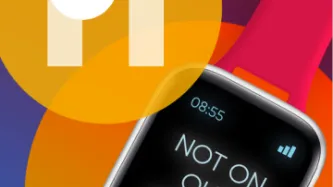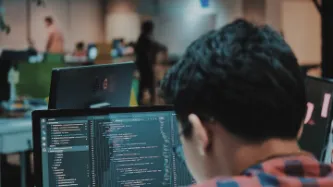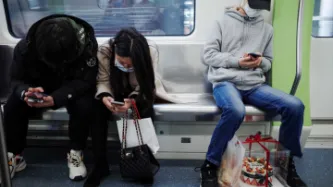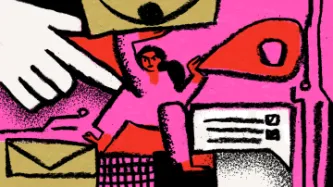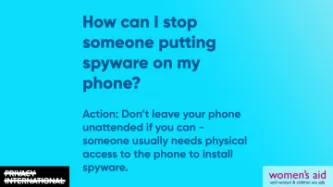Search
Content type: Long Read
Covid Apps are on their way to a phone near you. Is it another case of tech-solutionism or a key tool in our healthcare response to the pandemic? It’s fair to say that nobody quite knows just yet.
We’ve been tracking these apps since the early days. We’ve been monitoring Apple and Google closely, have been involved in the UK’s app process, our partners in Chile and Peru have been tracking their governments’ apps, and more.
Of course privacy concerns arise. But only a simplistic analysis would…
Content type: Video
This week Gus chats with Edin, PI's Advocacy Director, about the latest Covid-19 news and the trends we're seeing around the world.
Find out more about coronavirus apps around the world: https://privacyinternational.org/long-read/3675/theres-app-coronavirus-apps and keep an eye on the global responses: https://privacyinternational.org/examples/tracking-global-response-covid-19
Music by Glass boy - licensed under creative commons
Find more from them here: https://glassboy.bandcamp.com/album/…
Content type: Case Study
The run up to Kenya’s 2017 elections was extremely tense. Kenya has a history of violently fought elections and there was fear this election would be no different. It was in this tense environment, that companies like Cambridge Analytica and Harris Media – and their digital offerings - got involved in the election campaigns.
Cambridge Analytica’s business model is by now familiar, they compiled a huge amount of data points, often through illegal means, to create profiles on individuals –…
Content type: Long Read
This week saw the release of a coronavirus tracking app within the United Kingdom, initially to be trialled in the Isle of Wight. Privacy International has been following this closely, along with other ‘track and trace’ apps like those seen in over 30 other countries.
The UK’s app is no different. It is a small part of a public health response to this pandemic. As with all the other apps, it is vital that it be integrated with a comprehensive healthcare response, prioritise people, and…
Content type: Long Read
Photo by Cade Roberts on Unsplash
For those of you who don't spend the most productive part of your day scanning the news for developments about data and competition, here's what has been going on in the UK since summer 2019.
Basically, the UK competition authority started an investigation into online platforms and digital advertising last summer, and issued their preliminary findings in December 2019, concluding that Facebook and Google are very powerful in the search engine and social media…
Content type: Advocacy
For a long but fun analysis of the current competition and data state of play in the UK, click here.
Background
PI broadly welcomes the CMA’s interim findings, many of which correspond with issues of longstanding concern to PI and with the points raised in our response to the CMA’s Statement of Scope.
This includes the indication that Google and Facebook have a dominant or strategic position in major elements of the digital advertising market which can -at least, partially- be attributed to the…
Content type: Long Read
UPDATE 21/07/2020: On Monday July 20th, the Israeli parliament approved a new bill allowing the Ministry of Health to rely again on the Intelligence Services to track people who may have been exposed to Covid 19 when the number of new cases reaches 200 and above per day. The authorisation is then granted for three weeks and can be extended if the numbers have not decreased. The new law will be effective until January 2021. As of July 21st and for at least the next three weeks, the Intelligence…
Content type: Examples
Three days after announcing Germany would adopt the centralised Pan-European Privacy-Preserving Proximity Tracing (PEPP-PT) standard for contact tracing, the country's chancellery minister Helge Braun and health minister Jens Spahn announced they would instead use the decentralised approach backed by Apple, Google, and other European countries. While both standards rely on Bluetooth connections between nearby phones, PEPP-PT would have required Apple's cooperation to implement, and the company…
Content type: News & Analysis
An estimated 90% of the world’s student population are affected by school closures in the Covid-19 pandemic. And, in the absence of physical space, education technology companies are stepping in to fill the gap. There are plenty of reasons to be excited about the potential of technology to provide support, but it’s important to consider the ongoing implications of which technology we choose, and the implications for those families who don’t have access to them in the first place.That’s why we’…
Content type: Video
Tech companies, governments, and international agencies have all announced measures to help contain the spread of the COVID-19, otherwise known as the Coronavirus. Unprecedented levels of surveillance, data exploitation, and misinformation are being tested across the world.
Many of those measures are based on extraordinary powers, only to be used temporarily in emergencies. Others use exemptions in data protection laws to share data. Some may be effective and based on advice from…
Content type: Advocacy
Background
In February 2020, the Australian Competition and Consumer Commission (ACCC) commenced an investigation into the proposed acquisition of Fitbit by Google, which was originally announced in November 2019.
Google, whose parent company, Alphabet, in 2018, generated 85% of its $136.22 billion in revenue from delivering targeted advertisements, has a past of competition law infringements in the European Union. Fitbit is a company that produces and sells health tracking technologies and…
Content type: Long Read
The organised opposition to sexual and reproductive rights has gone digital. Data exploitative tech is being developed that is capable of obtaining vast amounts of intimate information about people’s reproductive health, and delaying or curtailing access to reproductive healthcare.
Technology provides incredible opportunities to democratise access to reproductive health information, services, and care. It can play a vital role in protecting the lives of those needing sexual and reproductive…
Content type: News & Analysis
A few weeks ago, its name would probably have been unknown to you. Amidst the covid-19 crisis and the lockdown it caused, Zoom has suddenly become the go-to tool for video chat and conference calling, whether it’s a business meeting, a drink with friends, or a much needed moment with your family. This intense rise in use has been financially good to the company, but it also came with a hefty toll on its image and serious scrutiny on its privacy and security practices.
While Zoom already had a…
Content type: Long Read
‘Let’s build an app for that’ has become the response to so many things. It’s no surprise it’s happening now.
Apps are notorious for their lack of security and privacy safeguards, exploiting people’s data and devices. Now we’re being asked to trust governments with their proposed apps -- of which there are many. These are the very same governments who have been keen to exploit data in the past. For instance, PI currently has four outstanding legal cases arising from the last times governments…
Content type: Video
PI's Reproductive Rights and Privacy Project speaks with Tasneem Mewa and Ambika Tandon from the Center for Internet and Society about data exploitation in reproductive rights in India.
This podcast is part of a special series from PI's Reproductive Rights and Privacy Project.
The series comes out on the last Monday of every month.
You can listen and subscribe to the podcast where ever you normally find your podcasts:
Spotify
Apple podcasts
Google podcasts
Castbox
Overcast
Pocket…
Content type: Examples
Google has begun publishing "COVID-19 Community Mobility Reports", which analyse the location data it collects from smartphones to create maps of aggregated changes in the movement of populations around the world. Google claims the data is "anonymised" via differential privacy, and suggests that governments can use the results of its analysis to understand not only whether people are travelling but where, so they can adapt transport policies to ensure adequate distancing. It is unclear how…
Content type: Examples
Apple and Google have announced a partnership to enable governments and health agencies to use Bluetooth for proximity-based contact tracing to help reduce the spread of the novel coronavirus while preserving user privacy and security. The effort is due to begin with the May release of APIs that will enable Android and iOS devices using apps from public health authorities to interoperate. The two companies will go on to build Bluetooth-based contact tracing into their underlying platforms. The…
Content type: Examples
On the second day of India's nationwide shutdown due to the COVID-19 outbreak, the Karnataka government published the home addresses of quarantined residents, as a deterrent to breaking the rules. The list included individuals who had flown in from a foreign country and been asked to stay indoors for two weeks but who had not tested positive for the novel coronavirus. Although the government deleted a tweet announcing its intention, the list is still available on its website and is circulating…
Content type: News & Analysis
This week International Health Day was marked amidst a global pandemic which has impacted every region in the world. And it gives us a chance to reflect on how tech companies, governments, and international agencies are responding to Covid-19 through the use of data and tech.
All of them have been announcing measures to help contain or respond to the spread of the virus; but too many allow for unprecedented levels of data exploitation with unclear benefits, and raising so many red flags…
Content type: Video
This week: it's a weird one - rather than our normal look at technology, we've got recommendations for movies and games you might enjoy while you're locked down.
Music by Simon Mathewson, you can find more from him here: https://freemusicarchive.org/music/Simon_Mathewson
Recommendations include:
Sorry to Bother You
Legally Blonde
S-Club Seeing Double
Snowpiercer
Broforce
Ultimate Chicken Horse
Hidden in plain site
Don't starve
You can listen and subscribe to the podcast where…
Content type: News & Analysis
These are difficult and challenging times around the world.
In this global crisis, businesses are stepping in to support efforts by Governments and public health authorities to seek to control the impact of the virus.
This is important, as help of all kinds is sorely needed. However, we must also be wary that industry initatives and public-private partnerships are not used as an opportunity to profit from this crisis or to exploit data without legal safeguards.
Companies all over the world…
Content type: Examples
On November 3rd, 2019, [...] a critical vulnerability affecting the Android Bluetooth subsystem [was reported]. This vulnerability has been assigned CVE-2020-0022 and was now patched in the latest security patch from February 2020. The security impact is as follows:
On Android 8.0 to 9.0, a remote attacker within proximity can silently execute arbitrary code with the privileges of the Bluetooth daemon as long as Bluetooth is enabled. No user interaction is required and only the Bluetooth MAC…
Content type: Case Study
The right to privacy is crucial to protect a couple’s equal rights within marriage.
The recent rise of spyware as an “off-the-shelf” product that anyone can purchase has been extremely worrying, as installing spyware on someone else’s phone means getting access to their contacts, their messages, their google searches, their location and more - all without them knowing.
Spyware is, increasingly, becoming another way for abusive spouses to control and monitor their partners. Nearly a third of…
Content type: Video
We can’t believe we’re having to say this, but the hours after giving birth are private. If you’re a parent, you may have heard of Bounty, a sales and marketing company allowed access to hospital maternity wards and approach women who have just given birth. This doesn’t happen on any other hospital ward. Can you imagine coming round from major surgery to find a stranger trying to sell you stuff? The physical invasion of privacy is bad enough, but delving into the company’s relationship with…
Content type: Examples
After Asian countries used mass surveillance of smartphones to trace contacts and halt the spread of the coronavirus, Western countries such as the UK and Germany are trying to find less-invasive ways to use phones to collect and share data about infections that would work within data privacy laws and retain public trust. Nearly half of virus transmissions may occur before the individual shows symptoms of the disease. At Oxford researchers are working on a notification app that would notify…
Content type: Examples
Facebook's scientists are analysing location data about compliance with social distancing recommendations in various countries using information from a private vault of location information its apps have collected. The analysis shows that only "very modest" changes in habits in the US, France, and the UK, and much more substantial change in Spain and Italy between mid-February and mid-March. Other companies such as Google and Apple, may also be able to contribute insights into public behaviour…
Content type: Examples
US government agencies are considering a range of tracking and surveillance technologies as part of efforts to control the spread of the novel coronavirus. These include: geolocation tracking and facial recognition systems to analyse photos, both to enable contact tracing. Palantir is working with the Centers for Disease Control and Prevention to model the virus outbreak, and other companies that scrape public social media data have contracts in place with CDC and the National Institutes of…
Content type: Examples
On Wednesday, the government of Madrid will launch a free app to track COVID-19 cases similar to those developed in Asian countries such as South Korea, China, and Taiwan. The development is being carried out at no charge by developers from Google, Telefónica, Ferrovial, Goggo Network, Carto, ForceManager and Mendesaltaren, and is led by known entrepreneur Martín Varsavsky. The priority is to lessen the load on emergency numbers through the combination of users' health status and the places…
Content type: Examples
After the Iranian government produced the AC19 Android app, intended to help people self-diagnose rather than going to a hospital, Google pulled it from the Play Store apparently suspecting that the app made the misleading claim that it could detect COVID-19 infections although it is also true that developer accounts from Iran are not allowed on Google Play. The app, which is still available through the web, initially faced complaints that the Iranian government was using it as a means of…
Content type: Examples
Three years ago, the Alphabet subsidiary Verily developed a software platform, Project Baseline, to run clinical trials on a group of volunteers who agree to share their medical data with a group of researchers at pharmaceutical companies and research hospitals. In early March, Verily began considering whether and how the software could be used to help detect COVID-19. To date, the site is in beta mode, and consists of a questionnaire that links local Bay Area residents to three testing sites.…








